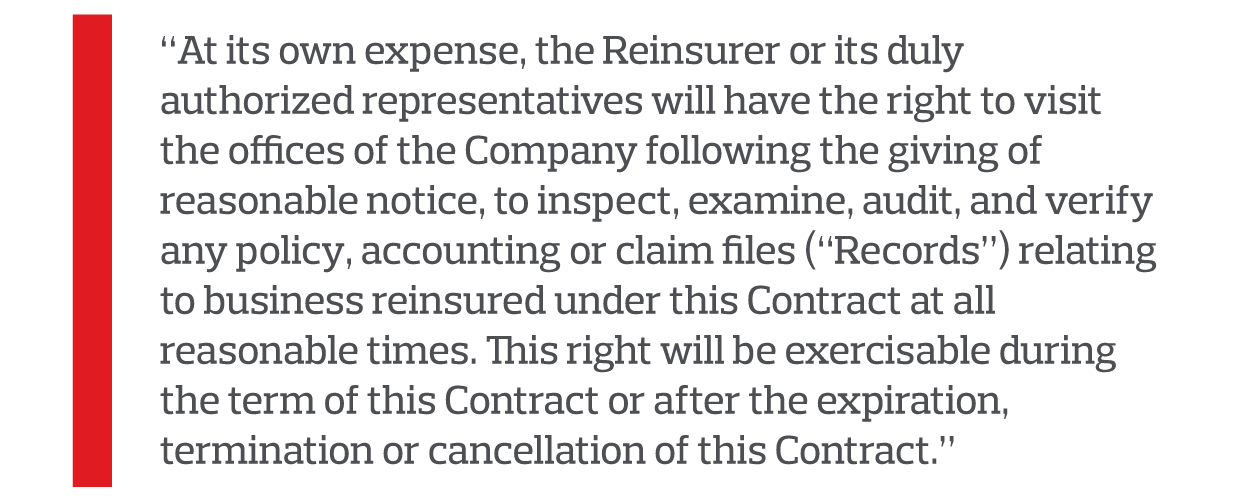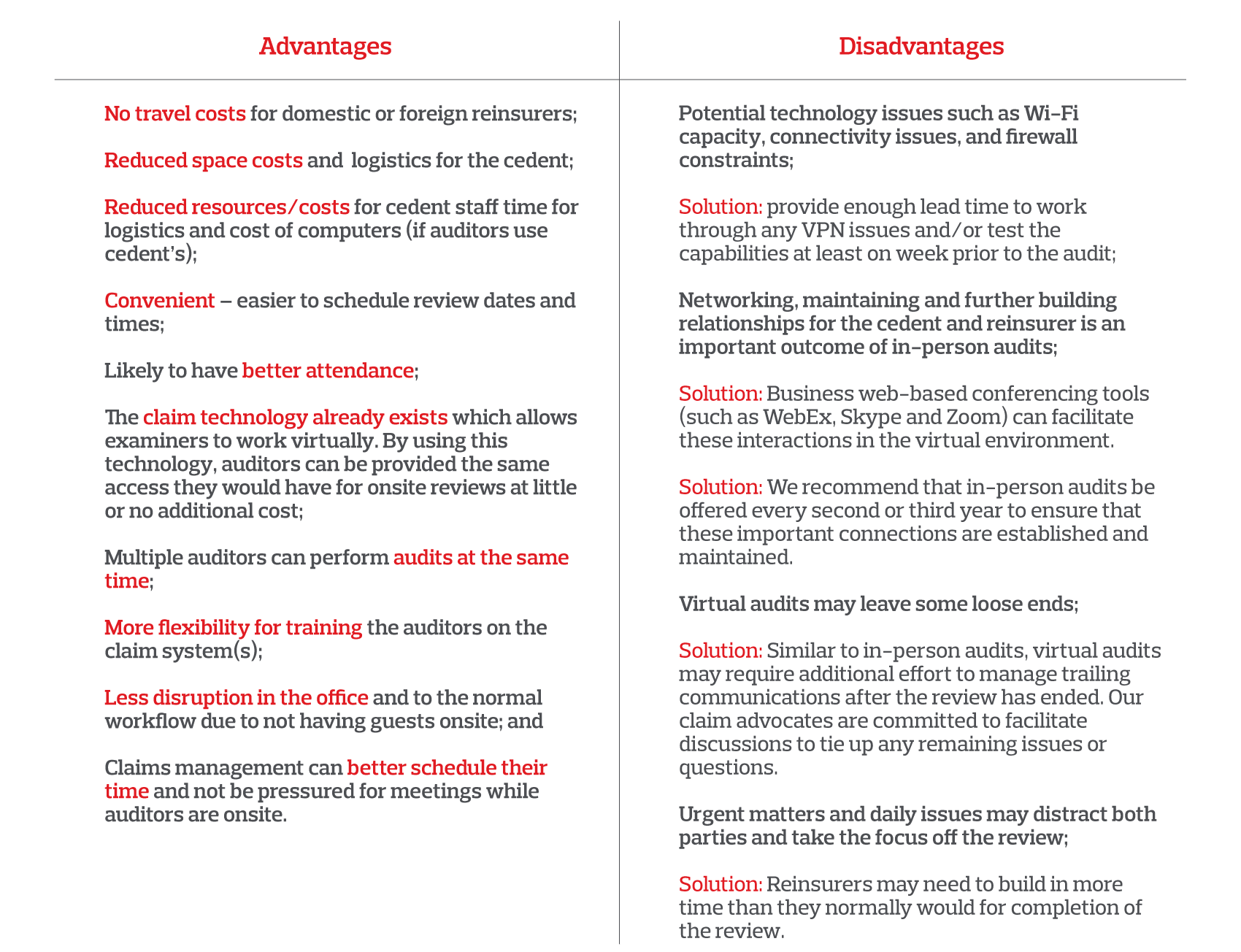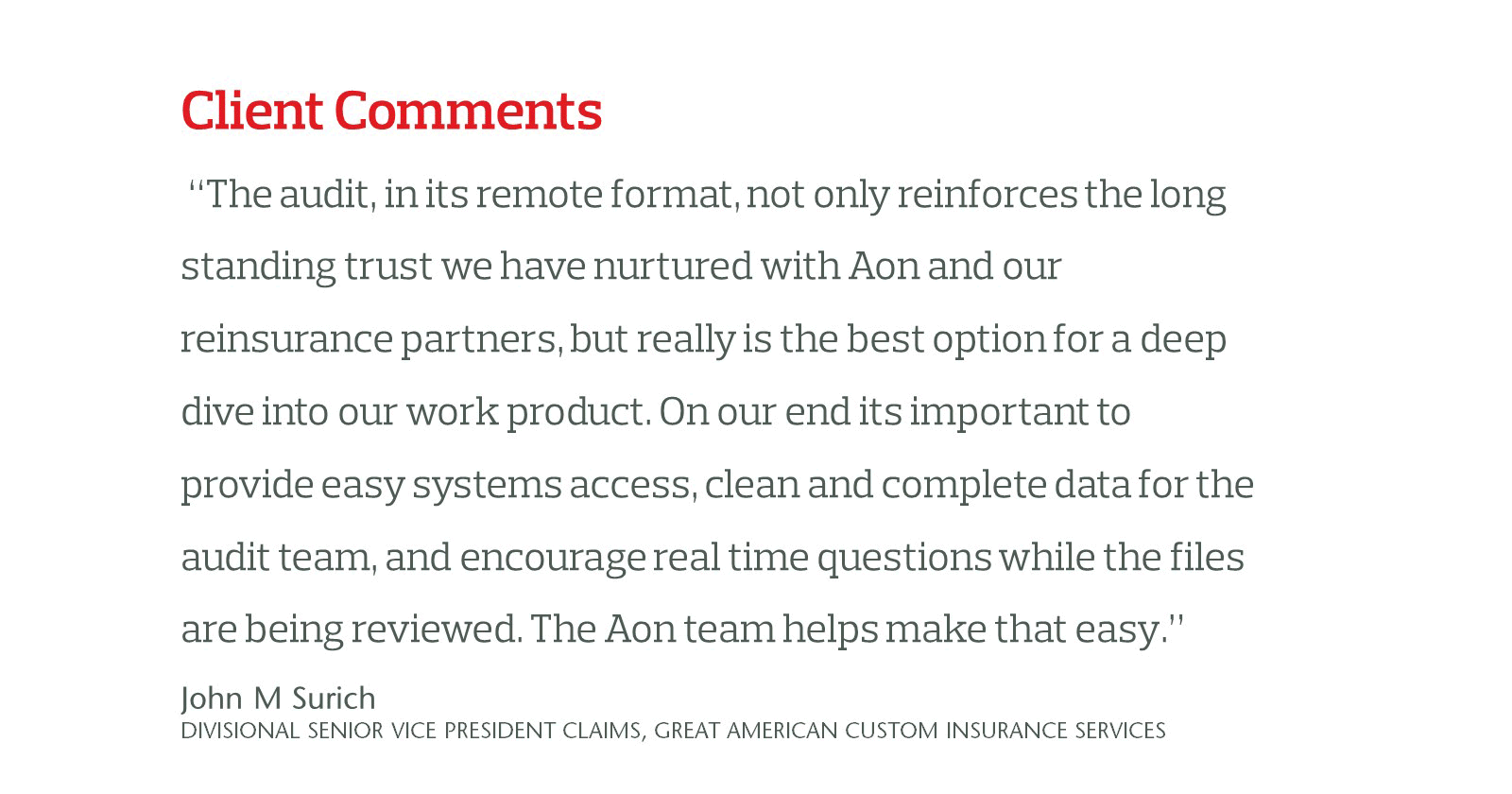Most reinsurance contracts contain an Access to Records provision which gives the reinsurers the right to review a cedent’s files. Historically these reviews take place at our clients’ offices but over the past few years there has been an increasing trend towards conducting these same audits electronically allowing the auditors to review files in a virtual setting. With the ability to conduct audits remotely, rather than requiring auditors to travel to the cedent’s office, cedents and reinsurers have gained more trust and appreciation for virtual claim audits. Now, more than ever, with the impact of COVID-19, virtual claim audits have come to the forefront as a necessity. We recommend that virtual claim audits become the new normal after the COVID-19 pandemic concludes as well.
Contractually bound:
Review a reinsurance contract and you’ll likely find a typical Access to Records provision that reads:

“At its own expense, the Reinsurer or its duly authorized representatives will have the right to visit the offices of the Company following the giving of reasonable notice, to inspect, examine, audit, and verify any policy, accounting or claim files (“Records”) relating to business reinsured under this Contract at all reasonable times. This right will be exercisable during the term of this Contract or after the expiration, termination or cancellation of this Contract.”
The purpose of the Access to Records provision is to provide the reinsurer the opportunity to review and assess the performance of the reinsurance contract(s) that it is participating in since the party’s interests are aligned. This provision stems from the duty of uberrimae fidei (Duty of Utmost Good Faith) and a cedent’s duty to disclose all pertinent risks. While some Access to Records provisions indicate that the reinsurer has a right to visit the office of the cedent, this should not deter a cedent from implementing virtual audits. The intent of this provision is to grant access to the records, not the cedent’s physical office. Indeed, electronic access to the records meets this obligation.
Claim reviews may be requested for a number of reasons but typically they are conducted either prospectively prior to a renewal to measure the expertise of the claims department, or retrospectively on older business to ensure that the cedent is complying with the terms of the reinsurance agreement. In either case reinsurers want to assess whether the outstanding reserves are adequate and whether additional case reserves may be warranted on their own books. The rights of inspection typically survive contract termination. Further, some Access to Records provisions may include other aspects such as attorney-client privileged documents, non-payment and more specificity around timing. The purpose of this paper is to discuss the ability to conduct virtual audits and the authors will not be addressing further aspects of an Access to Records clause.
A cedent may entertain anywhere between 1 and 25 audits in a year depending upon the size of the organization, reinsurance written, number of reinsurers on the risk, reinsurer’s appetite(s) for audits and whether or not the cedent prefers group audits (multiple reinsurers are invited at the same time) or single audits (only one reinsurer is granted permission at a time).
How to move from in person audits to virtual audits
Our Claim Advocates and Aon Inpoint Claims have conducted many successful virtual audits via remote connections with common claims management software such as Guidewire, Duck Creek, ImageRight and ImageDoc, as well as various home grown claims management systems. Much of the aspects of coordinating and conducting a good audit will remain the same for a virtual audit. Aon will ensure that the appropriate coordination of the audits will be handled by your claim advocate, minimizing our client’s efforts as much as possible.
To allow remote access, a virtual private network (VPN) is used to allow the reinsurers access to a cedent’s claim system in a secure and encrypted internet connection. Depending on the VPN provider or software being used, additional security layers such as multi-factor authentication (MFA) are also used. VPNs can be implemented with a wide variety of software as well as additional security options. The most common VPNs used are Citrix Gateway, Pulse Secure Client, Norton VPN, and ExpressVPN. Properly provisioned credentials will limit the auditors' view and access, thus mitigating security concerns. Reinsurer’s laptops may have a firewall or other type of security that may prevent a download, so it is recommended that the auditor ensure ample lead time to rectify this on their end.
Are virtual reviews a win-win for both parties?
With any change in procedure or way of doing business one must consider the advantages and disadvantages of making the change. Since virtual auditing impacts both parties, the pros and cons can differ based on perspective. Overall, however, we think that the advantages and benefits of virtual audits far outweigh the disadvantages. Further, we offer some solutions for the disadvantages to minimize these negative perceptions.

What is the industry opinion of virtual claim reviews?
We completed a survey of 22 clients and reinsurers regarding virtual audits which yielded some interesting results. Clients and reinsurers both stated that the convenience and cost effectiveness of a virtual review is undeniable. Reinsurers appreciate having the time back that they would have spent traveling to conduct the audit. It allows the auditors a chance to prepare their notes or even attend more audits as result of having fewer days on the road. However, the overarching criticism was the lack of a personal relationship and interaction with the client. It is felt that the in-person interaction with claims management and staff provides valuable insight about the claims operation that can’t be seen by reviewing files, participating on a conference call or a virtual meeting. To that end, we recommend that an in-person audit be offered every 2-3 years to ensure those relationships are maintained and furthered.
The second criticism was around the potential technology issues and ensuring that there is someone on staff at the cedent office as well as the reinsurer office to ensure these are corrected as quickly as possible. This is the one drawback of virtual audits. However, cedents and reinsurers often have the same technology issues even with in-person audits. The only added issue surrounds the remote VPN connection as discussed above.

Conclusion
Given the current situation with the COVID-19 pandemic, we recommend that virtual claim reviews be made available to reinsurers immediately. We also recommend that there is merit in extending this type of review beyond the current situation and making it part of your permanent procedures.
We are not suggesting that virtual audits are a stand-alone solution. To address the relationship building concern, we have a couple of recommendations. We recommend that onsite reviews be conducted, at a minimum, every 3rd year. This will allow for important networking and the personal connection tied to maintaining and building valuable business relationships. In addition, and where possible, we suggest that clients remain open to accommodating a reinsurer request to perform an in-person wrap up. A local reinsurer may want to meet to discuss their findings and ask questions at the client’s office when travel is not an issue. A hybrid approach like this can help build the relationship without jeopardizing the many advantages that will be gained by the virtual audit.
Another important step to making a successful virtual audit is that reinsurers be given access to the client’s system several days prior to the review in order to test the connectivity. This will give everyone time to work out technology issues in advance, so the review can proceed on schedule.
We have successfully facilitated virtual audits in the past and we are ready to assist our clients and reinsurers to make virtual audits successful as we move forward together. Our Reinsurance Solutions Client Services team, particularly your Claims Advocate, will work closely with our clients every step of the way to ensure the virtual reinsurance audit is a smooth process for the cedent and the reinsurer(s).
Should you require additional claims and quality management solutions for your direct claims, the Aon Inpoint Claims team has extensive experience in this space. Inpoint Claims provides strategic consulting and assessments of claim organizations to evaluate claims handling quality and leakage, as well as timeliness and accuracy of reserving practices. Clients have found this helpful in their routine operations as well as in preparation for a reinsurance audit. For more information, please contact Aon Inpoint Claims.
About the Authors
Richard Rosano is a Claims Solution Specialist with Aon. He graduated from St. Johns University (College of Insurance) in 1982 and has worked in the Insurance industry for over 40 years. He started his insurance career in 1979 as a claims examiner for Allstate Insurance Company. In 1983 he moved into the reinsurance arena and was the claims manager for Cigna Syndicate Managers and subsequently The Unity Group (currently Scor Re). In 1986 he moved into the reinsurance intermediary realm and was Assistant Vice President for The John P. Woods Co. which ultimately became Gallagher Re. In 2008 Richard joined Aon. His claim experience spans both Property and Casualty as well as Life, Accident and Health insurance.
Ann Field is a Senior Managing Director in Reinsurance Solutions at Aon. In her role as the North America Head of Client Services Operations, she oversees 75 Claim and Accounting Advocates, managing all premiums, claims, accounting and collections for Aon’s diverse segments and clients. Ann is an ARIAS•US certified arbitrator and a licensed attorney with over twenty-five years of significant experience in reinsurance and insurance coverage issues, arbitration and litigation. Ann is a frequent speaker at various industry conferences. In 2015, 2016, and 2019 Intelligent Insurer honored Field as one of the “Top 100 Women In Reinsurance.”